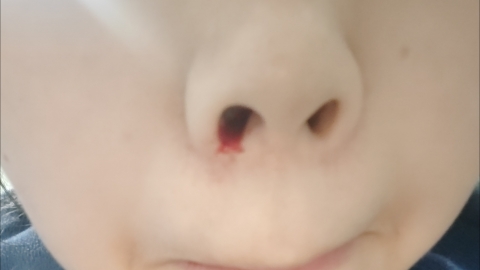What should I do if there is blood in my saliva?
Blood in saliva is generally caused by factors such as oral mucosal injury, dry air leading to nasal mucosa bleeding, gingivitis, chronic pharyngitis, or bronchiectasis. Depending on the specific situation, appropriate measures such as general management, medication, or surgical treatment may be used to improve the condition. Detailed analysis is as follows:
1. Oral Mucosal Injury
Consuming food that is too hot or hard, or brushing teeth too vigorously, can easily scratch the oral mucosa. When the mucosa breaks and bleeds, blood may mix with saliva and be spat out. Adjust your diet to include warm, soft foods; switch to a soft-bristled toothbrush and brush gently to avoid further injury.

2. Dry Air Causing Nasal Mucosa Bleeding
In dry climates or prolonged exposure to air-conditioned environments, the nasal mucosa loses moisture, becomes brittle, and prone to rupture and bleeding. Blood may flow through the posterior nasal passage into the oral cavity and be expelled with saliva. Use a humidifier to increase air moisture; drink plenty of water and use saline nasal spray to keep the nasal mucosa moist.
3. Gingivitis
Accumulation of dental plaque and tartar irritates the gums, causing inflammation, congestion, and swelling. Bleeding may occur during brushing or chewing hard foods, with blood mixing into saliva. Under medical guidance, hydrogen peroxide solution can be used for mouth rinsing, along with oral antibiotics such as amoxicillin capsules and metronidazole tablets. Regular professional teeth cleaning (scaling) and good oral hygiene are essential.
4. Chronic Pharyngitis
Long-term inflammation causes congestion of the pharyngeal mucosa and dilation of submucosal blood vessels, making them fragile. These vessels may rupture during coughing or swallowing, resulting in bleeding mixed with saliva. Under medical supervision, medications such as Qingyan Drop Pills, Pharyngitis Tablets, or Lanqin Oral Liquid may be taken. Avoid smoking and alcohol, stay away from dust and irritating gases, and reduce throat irritation.
5. Bronchiectasis
Destruction of bronchial wall structure leads to dilated and deformed airways, exposing submucosal blood vessels. Recurrent infections can cause vessel rupture and bleeding, which is coughed up with sputum and may mix with saliva. Under medical guidance, medications such as cefaclor capsules, ambroxol hydrochloride oral solution, and aminophylline tablets may be prescribed. For severe bleeding or localized lesions, bronchial artery embolization or lobectomy may be performed. After surgery, avoid vigorous coughing and take precautions against respiratory infections.
Routine care includes maintaining good oral hygiene by brushing teeth morning and night and rinsing after meals; keeping indoor humidity at an appropriate level to prevent dryness; drinking sufficient water and following a light diet, avoiding spicy and irritating foods; quitting smoking and avoiding polluted environments. If blood streaks appear frequently or bleeding increases, seek prompt medical evaluation to identify the underlying cause and receive timely treatment.




